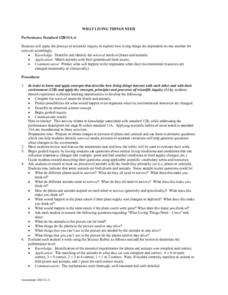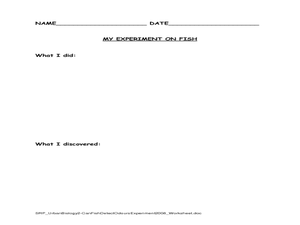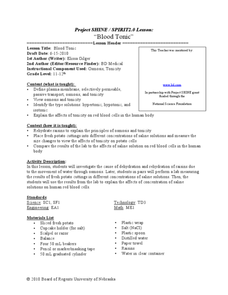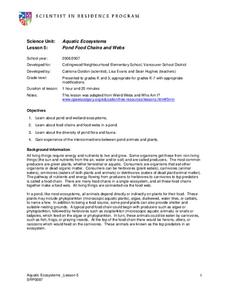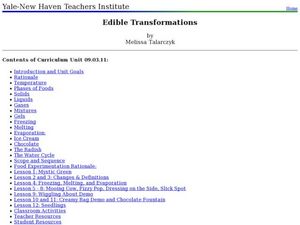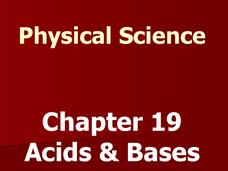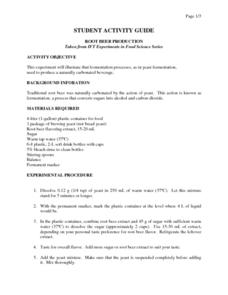Curated OER
Structural and Behavioral Adaptations
Students participate in a role playing lab that allows students to experience how different beak adaptations play a role in the type of food the animal can eat, therefore playing a role in the survival of the species.
Curated OER
Electromagnets- 6 Mini Investigations
Third graders discover the properties of electromagnets through experiments. In this electromagnet properties lesson, 3rd graders complete six tasks with an elctromagnet. Students recognize that the wires will heat up when connected to...
Curated OER
The Great Ocean Conveyor
Students investigate water density. In this water density lesson, students conduct an experiment with food coloring, water and salt to see how the salt effects bodies of water.
Curated OER
What Do Snails Eat?
Students conduct a food choice experiment with snails, recording the results on a chart to determine what snails eat. In this what do snails eat lesson, students color a picture of snail anatomy, perform the experiment with 3 food...
Curated OER
Bacteria in Your Life
In this bacteria learning exercise, students conduct an experiment by looking through their cupboard and refrigerator at home and locating the expiration date on six foods. Then they record what they found in the table shown. Students...
Curated OER
What Living Things Need
Students apply the process of scientific inquiry to explore how living things are dependent on one another for survival. They match animals with their generalized food source. Students predict what happens to the organisms when their...
University of Georgia
Flavor of Organic Chemistry
Introduce organic chemistry through an analysis of flavor. A three-part unit begins with an overview of the components of flavor. Next, scholars prepare esters through esterification. Finally, they examine how all senses have an impact...
Curated OER
Urban Biology: Can Fish Detect Odors
Learners investigate how fish use their sense of smell. In this scientific method lesson, students design and perform an experiment to investigate how fish use their sense of smell. This lesson includes statistical analysis and safety ...
Curated OER
Kingdom Fungi
In this kingdom fungi instructional activity, students conduct an experiment creating and observing dough. They describe what happened to the dough while they observed it and name the type of fungus is the yeast added. Students also...
Curated OER
Water Pollution
Students explore the causes of water pollution. In this environmental instructional activity, students conduct experiments with natural filtration systems.
Curated OER
Properties of Color
Second graders explore the properties of primary color and investigate what happens when primary colors are mixed. They listen to the story The Crayon Box That Talked and list the colors. They experiment mixing primary colors and...
Curated OER
Water: Liquid or Solid?
First graders investigate how water can be both a liquid and a solid. They weigh popsicles and observe them as they write in their science journals. They measure the liquid as the popsicle melts and refreeze them to change them back...
Curated OER
Blood Tonic
Students investigate the process of osmosis using fresh potato cuttings in saline solution. In this biology lesson, students explain the difference between hypertonic, hypotonic, and isotonic solutions. They collect data from the...
Curated OER
Aquatic Ecosystems
Students study ponds and wetland ecosystems and examine the food chains and webs in them. In this aquatic ecosystems lesson plan students answer questions about the diversity of the flora and fauna in a pond.
Curated OER
Edible Transformations
Students differentiate the different phases of matter. In this chemistry lesson plan, students conduct several hands-on exercises to discover how matter transforms when mixed together. They identify the different stages in the water cycle.
Curated OER
Demonstration of Cheese-Making Enzyme Magic
Students watch a demo which is a modification of an enzyme lab which is done as a "magic show". It's primary purpose is to tickle the curiosity of the student and grab interest before discussion of enzymes. It is also used to stimulate...
Mr. E. Science
Acids, Bases and Solutions
If you are not part of the solution, then you are part of the precipitate. The presentation covers solutions, suspensions, solubility, dissociation, and acid/base reactions. This is the 19th lesson in a series of 26.
Curated OER
Mold
Students explore mold, the different types and the health risks that they pose. In this mycelium lesson students grow different molds and see which type of foods mold the fastest.
Curated OER
Animal Adaptations: Focus on Bird Beaks
Sixth graders explore bird beaks as animal adaptation. In this bird adaptation lesson, 6th graders conduct an experiment to determine the connection between the shape of a bird's beak and the food it eats.
Curated OER
Root Beer Production
In this fermentation worksheet, students conduct an experiment to illustrate how the yeast fermentation process is used to produce carbonation. This worksheet has 5 short answer questions.
Curated OER
Bird Beak Adaptation Lab
Middle schoolers investigate bird beaks to determine which physical adaptations are necessary based on the types of food the birds eat. They participate in a lab by visiting multiple stations to determine which beaks are most efficient,...
Curated OER
Testing for Catalase Activity
In this catalase worksheet, students read about how enzymes work in cells. Then students conduct an experiment to test for catalase activity in potatoes. This worksheet has 1 graph and 6 short answer questions.
Curated OER
Working Worms
Students study earthworms and their role in creating healthy soil for healthy food. In this earthworms and soil lesson, students complete an jug experiment to learn about the role of earthworms and healthy soil. Students read and discuss...
Curated OER
Revised “Understanding Nutrition” Activity
Students evaluate their current food choices. In this health science lesson, students test different drinks to rate the amount of Vitamin C content. They discuss results in class.







